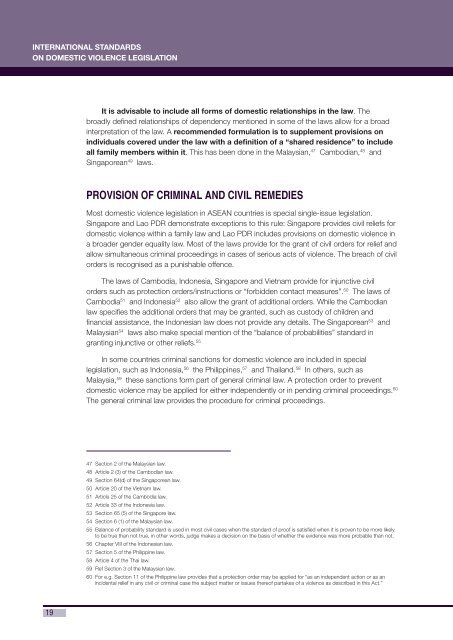Domestic Violence Legislation and its Implementation
Domestic Violence Legislation and its Implementation
Domestic Violence Legislation and its Implementation
You also want an ePaper? Increase the reach of your titles
YUMPU automatically turns print PDFs into web optimized ePapers that Google loves.
INTERNATIONAL STANDARDS<br />
ON DOMESTIC VIOLENCE LEGISLATION<br />
19<br />
It is advisable to include all forms of domestic relationships in the law. The<br />
broadly defi ned relationships of dependency mentioned in some of the laws allow for a broad<br />
interpretation of the law. A recommended formulation is to supplement provisions on<br />
individuals covered under the law with a defi nition of a “shared residence” to include<br />
all family members within it. This has been done in the Malaysian, 47 Cambodian, 48 <strong>and</strong><br />
Singaporean 49 laws.<br />
PROVISION OF CRIMINAL AND CIVIL REMEDIES<br />
Most domestic violence legislation in ASEAN countries is special single-issue legislation.<br />
Singapore <strong>and</strong> Lao PDR demonstrate exceptions to this rule: Singapore provides civil reliefs for<br />
domestic violence within a family law <strong>and</strong> Lao PDR includes provisions on domestic violence in<br />
a broader gender equality law. Most of the laws provide for the grant of civil orders for relief <strong>and</strong><br />
allow simultaneous criminal proceedings in cases of serious acts of violence. The breach of civil<br />
orders is recognised as a punishable offence.<br />
The laws of Cambodia, Indonesia, Singapore <strong>and</strong> Vietnam provide for injunctive civil<br />
orders such as protection orders/instructions or “forbidden contact measures”. 50 The laws of<br />
Cambodia 51 <strong>and</strong> Indonesia 52 also allow the grant of additional orders. While the Cambodian<br />
law specifi es the additional orders that may be granted, such as custody of children <strong>and</strong><br />
fi nancial assistance, the Indonesian law does not provide any details. The Singaporean 53 <strong>and</strong><br />
Malaysian 54 laws also make special mention of the “balance of probabilities” st<strong>and</strong>ard in<br />
granting injunctive or other reliefs. 55<br />
In some countries criminal sanctions for domestic violence are included in special<br />
legislation, such as Indonesia, 56 the Philippines, 57 <strong>and</strong> Thail<strong>and</strong>. 58 In others, such as<br />
Malaysia, 59 these sanctions form part of general criminal law. A protection order to prevent<br />
domestic violence may be applied for either independently or in pending criminal proceedings. 60<br />
The general criminal law provides the procedure for criminal proceedings.<br />
47 Section 2 of the Malaysian law.<br />
48 Article 2 (3) of the Cambodian law.<br />
49 Section 64(d) of the Singaporean law.<br />
50 Article 20 of the Vietnam law.<br />
51 Article 25 of the Cambodia law.<br />
52 Article 33 of the Indonesia law.<br />
53 Section 65 (5) of the Singapore law.<br />
54 Section 6 (1) of the Malaysian law.<br />
55 Balance of probability st<strong>and</strong>ard is used in most civil cases when the st<strong>and</strong>ard of proof is satisfi ed when it is proven to be more likely<br />
to be true than not true, in other words, judge makes a decision on the basis of whether the evidence was more probable than not.<br />
56 Chapter VIII of the Indonesian law.<br />
57 Section 5 of the Philippine law.<br />
58 Article 4 of the Thai law.<br />
59 Ref Section 3 of the Malaysian law.<br />
60 For e.g. Section 11 of the Philippine law provides that a protection order may be applied for “as an independent action or as an<br />
incidental relief in any civil or criminal case the subject matter or issues thereof partakes of a violence as described in this Act.”

















